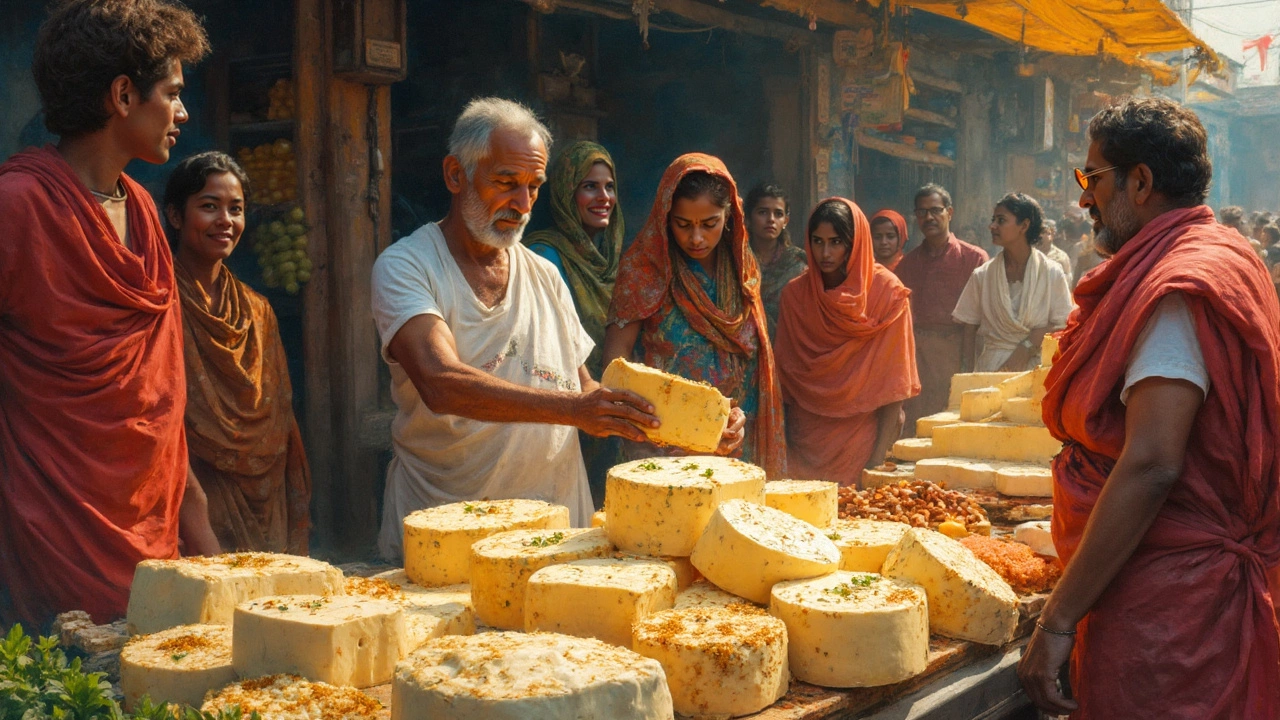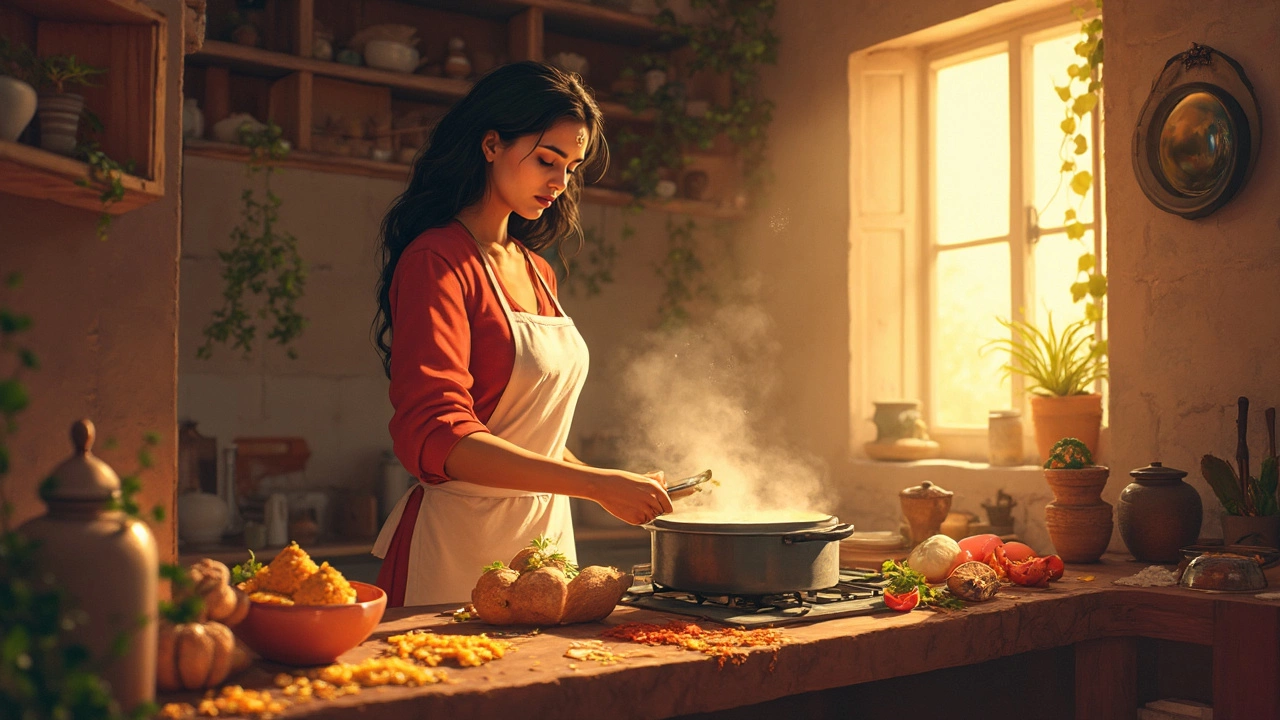Paneer, that deliciously soft yet chewy cheese block, is a go-to for many of us, particularly in Indian cuisine. Ever wondered if it was actually good for you? You're not alone. This staple ingredient, often added to curries and salads, is beloved for taste and versatility, but its health effects can be a mixed bag.
When we're talking about homemade paneer, there's an extra layer of consideration. The beauty of making it at home is that you control what goes into it. Basic ingredients like milk and an acidic agent such as lemon juice, and voila, you have homemade paneer! But does it pack a nutritional punch or a caloric conundrum?
Knowing the pros and cons of paneer might help you include it in a balanced diet. Sure, it's rich in protein and calcium—essential for bone health. But there are also factors to consider like fat content, especially if weight is a concern. So, how do we enjoy our beloved paneer without going overboard?
Stick around as we dig deeper into the facts and offer some practical tips for making and savoring your paneer without a side of guilt!
- What is Paneer?
- Nutritional Benefits of Homemade Paneer
- Potential Drawbacks of Consuming Paneer
- Tips for Making and Using Paneer at Home
What is Paneer?
Paneer is a fresh cheese common in Indian cuisine, often recognized for its myriad uses in savory dishes. Known as Indian cottage cheese, it's typically made from cow's milk or buffalo milk. The process involves curdling the milk with an acidic agent like lemon juice or vinegar, then separating the curds and pressing them into blocks. That's it!
This cheese is prized not only for its texture, which beautifully soaks up flavors, but also for its nutritional value. Because homemade paneer involves minimal processing, it's free from additives and preservatives that are often present in store-bought versions.
How Paneer Came to Be
The origin of paneer can be traced back to the Indian subcontinent, where it has been enjoyed for centuries, both as a standalone ingredient in dishes and as a meat substitute for vegetarians.
- Versatility: From a savory palak paneer (spinach and cheese curry) to being crumbled over salads, its versatility knows no bounds.
- Texture: Thanks to its soft but firm texture, paneer retains a unique bite when cooked, unlike ricotta or feta.
If you're making it at home, you'll find that having the power to tweak its taste and texture can make a world of difference. Adding herbs or spices directly into the cheese can give you a flavored paneer tailored to your culinary needs.
Fun fact: While most cheeses melt, paneer's firm structure helps it hold its shape when cooked, making it perfect for grilling or frying, especially in those deliciously crispy paneer tikka recipes.
Nutritional Benefits of Homemade Paneer
Homemade paneer isn't just a treat for your taste buds, it’s also a powerhouse of nutrients. First thing’s first—paneer is loaded with protein, which is great for building and repairing tissues. It’s often a preferred source of protein in vegetarian diets, giving muscles and bones the fuel they need.
Got milk? Well, paneer does. Since it’s made from milk, it’s brimming with calcium and phosphorus, key minerals for maintaining strong bones and healthy teeth. Consistent consumption can play a part in preventing bone-related issues like osteoporosis.
Rich Source of Protein
Protein is an essential nutrient, and homemade paneer delivers a good chunk of it. For those who don't consume meat, it’s a solid alternative. A serving of paneer can contribute significantly to daily protein needs, helping you feel satiated while supporting muscle growth.
Beneficial Fats and Carbs
Yes, there’s fat in paneer, but it’s not all bad. Paneer contains healthy fats that are necessary for hormone production and absorbing vitamins. Plus, it provides complex carbs that are great for energy. Just be mindful of the portion size if you’re watching your weight.
Additional Nutrients
Paneer also offers micronutrients such as vitamin A, which is beneficial for maintaining good vision and skin health. It’s got a good dose of B vitamins as well, contributing to overall energy levels and brain health.
Here's a quick look at what you get per 100 grams of paneer:
| Nutrient | Value |
|---|---|
| Protein | 18 grams |
| Calcium | 200 mg |
| Fat | 20 grams |
| Carbohydrates | 2 grams |
While enjoying homemade paneer, remember it’s all about balance and moderation. Including it as part of a varied diet can certainly boost your nutrition game.

Potential Drawbacks of Consuming Paneer
While paneer is a much-loved part of a lot of diets, it's not all sunshine and rainbows. There are a few things to watch out for, especially if you're thinking about eating it regularly.
High in Calories and Fat
The first thing you should know is that paneer can be pretty calorie-dense. A small cube might not seem like much, but it adds up quickly. It's generally high in saturated fats. If you’re keeping an eye on your weight or heart health, this is something to definitely keep in mind.
Lactose Concerns
If you're lactose intolerant, eating homemade paneer might not be the best idea. While it doesn't contain as much lactose as milk, it can still cause discomfort for some people. Bloating, gas, or an upset stomach after eating paneer might be signs to scale back.
Sodium Levels
Watch out for the salt. Paneer doesn't naturally have to be high in sodium, but adding salt during preparation or in dishes can make it so. High sodium isn't great for blood pressure, so it's something to be mindful about when enjoying your favorite paneer delicacies.
Potential Additives in Store-Bought Paneer
If you're not making paneer at home, you might get a version loaded with preservatives or additives to extend shelf life. These don't just alter the taste, but they might not be good for your health either. That's why homemade paneer is a safer bet—it's pure and free from the extras.
Table: Nutritional Components
To give you a clearer picture, here's a sneak peek at some nutritional figures related to a typical serving of paneer:
| Nutrient | Amount (per 100g) |
|---|---|
| Calories | 265 kcal |
| Fat | 21g |
| Protein | 18g |
| Carbohydrates | 1.2g |
Ultimately, enjoying paneer in moderation and choosing the right kinds can help you stay on track health-wise. Balance and awareness can make a huge difference!
Tips for Making and Using Paneer at Home
Making homemade paneer is surprisingly simple and satisfying. Plus, it allows you to customize taste and texture, making it softer or firmer depending on your dish.
How to Make Paneer
- Gather Your Ingredients: You'll need fresh milk (the richer, the better for creamy paneer) and an acidic agent like lemon juice or vinegar.
- Heat the Milk: Pour the milk into a pot and bring it to a gentle simmer, stirring occasionally to avoid scalding.
- Add the Acid: As the milk reaches a boil, add the lemon juice or vinegar. You'll see it start to curdle, separating into soft curds and whey.
- Strain the Curds: Line a sieve with cheesecloth and pour the mixture through. Rinse the curds under cold water to remove the acidic taste.
- Press the Paneer: Wrap the curds in the cloth and place a weight on top to press out excess water and shape the paneer. Leave this for at least an hour.
And there you have it! Your paneer is ready to be cubed and cooked in your favorite dish.
Creative Ways to Use Paneer
- Curries: Classic paneer butter masala or palak paneer can be a part of your meal rotation. The paneer absorbs spices beautifully.
- Stir-fries: Toss paneer cubes with veggies for a quick and fulfilling meal.
- Grilled Skewers: Marinate the paneer in spices, thread onto skewers with vegetables, and grill for a delicious BBQ option.
- Salads: Add cubed paneer to salads for an extra protein boost.
Storing Your Paneer
Homemade paneer stays fresh for up to a week in the fridge when stored in an airtight container. If you make more than you need, freeze it for future use. Remember to thaw thoroughly before cooking.
Paneer Nutritional Value
| Nutrient | Amount per 100g |
|---|---|
| Protein | 18g |
| Calcium | 200mg |
| Calories | 265kcal |
With such high protein and calcium content, homemade paneer is a great addition that fits many dietary needs!
